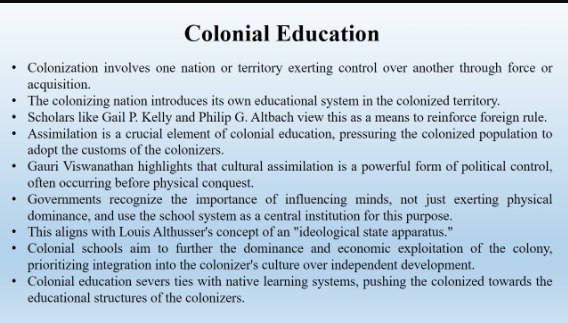
Impact of Colonial Education Policies: Legacy & Lessons
Colonial education policies significantly disrupted indigenous cultures and served primarily to benefit the colonizers. These policies prioritized European knowledge, marginalizing local wisdom and languages.
Throughout the colonial period, Education served as a powerful tool for colonial powers to propagate their values and languages at the expense of indigenous cultures. Colonial education systems often aimed to produce a class of intermediaries who would assist in administering colonial governments, thereby reinforcing the colonizers’ economic and political dominance.
These policies frequently devalued traditional knowledge as Western curricula and languages were instituted, erasing local identity and heritage elements. At the same time, access to this Education was typically limited, creating a profound social divide. Today, the legacies of colonial Education continue to impact societies, contributing to ongoing debates regarding the language of instruction, curriculum content, and the broader aims of education systems in former colonial territories.
Colonial Education Systems: Then And Now
The colonial education systems shaped many countries. Europeans built schools in colonies long ago. These schools taught European culture and ideas. Kids learned to respect European ways. This Education made them forget their own cultures.
Education today comes from those old times. Modern schools still have subjects from Europe. Yet now, kids also learn about their own cultures. Many books and ideas are from Europe or the USA.
Countries are trying to change this. They want schools to teach more local knowledge, which means new books and subjects. This significant change helps kids love their own cultures more.
Imposed Curricula: Molding Minds For Empire
The colonial education policies heavily focused on curricula that served imperial goals. These curricula often included history and values that glorified the colonizer and undermined local cultures. Knowledge taught in schools was selected to create a compliant and administratively functional population, which furthered the colonizers’ control.
Local resistance played a significant role in challenging and sometimes changing these educational systems. Groups often fought to preserve traditional knowledge and promote indigenous Education. This resistance aimed to protect cultural identity and reject the imposed values of the empires.
Languages Of Power: Linguistic Imperialism In Classrooms
The introduction of colonial languages in Education was a significant strategy. It created a linguistic hierarchy favouring the colonizers’ tongue. This policy led to the widespread adoption of languages like English, French, and Spanish. They became dominant in school curricula. Colonial powers pushed these languages as symbols of progress and civilization.
On the flip side, this focus deeply affected indigenous languages and cultures. Many local dialects faced reduced usage and prestige. Some languages even faced the threat of extinction. Native speakers experienced pressure to adopt the new colonial language. It caused a rift in cultural continuity and heritage. The long-term effects of these policies are still visible today.
| Colonial Language Promotion | Impact on Indigenous Cultures |
| Adopted as a medium of instruction | Indigenous languages less spoken |
| Seen as superior for advancement | Traditional practices devalued |
| Used in government and law | Local identities undermined |
Assessing Outcomes: Colonial Education’s Impact On Society
The colonial education system heavily influenced societal structures. It created deep socio-economic divisions, often favouring elite groups. Education under colonial rule reinforced class divides, concentrating wealth and opportunities among those aligned with the colonizers.
Furthermore, this system promoted cultural assimilation, leading to the loss of indigenous knowledge and languages. Schools taught the language and values of the colonizers, causing a shift in cultural identity. Traditional practices were neglected, and local customs and heritage were eroded over time. The legacy of these policies still affects many societies today, with linguistic homogenization and altered social landscapes being notable consequences.
Resistance And Reform: The Fight For Educational Autonomy
Early resistance movements were crucial for challenging colonial education systems. These movements aimed to protect and revive traditional learning, which people knew was crucial for maintaining their identity and culture. Influential leaders spoke out, and communities rallied around Education.
Post-colonial education reforms focused on decolonizing curriculums. Nations sought to develop systems more reflective of their histories and values. Schools began teaching local languages and literature. Local cultures became a core part of schooling, helping students reconnect with their heritage.
Continuing Legacies: Echoes In Modern Education Systems
Structural remnants in current institutions show a clear link to the colonial past. School systems often mirror those from colonial times. Many places still use similar curriculums and teaching methods. This link affects how countries view Education. Some argue it hinders progress.
Ongoing debates and disparities remain hot topics. Equal access to Education is rare. Former colonies sometimes struggle more. The education quality varies widely. The discussions show a need for change. These issues reflect deep-set colonial influences.
Case Studies: Analyses Of Education Policies In Former Colonies
Colonial education policies greatly affected different regions, each facing unique challenges and successes. Asia’s education systems evolved differently from those in Africa.
For instance, Singapore built a robust system, leading to a knowledge-based economy. In contrast, some African nations struggled due to the policy of separating races. This led to different education standards.
- Singapore: Education policy fostered high literacy rates.
- Nigeria: Policies led to unequal resource distribution.
- India: Colonial policies laid the groundwork for a modern educational infrastructure.
Navigating The Path Forward: Lessons Learned
Colonial education policies left a lasting mark. These policies ignored local wisdom and languages. We must embrace traditional knowledge to create a future of inclusive and equitable Education. Emphasizing age-old wisdom can enrich learning experiences. Teachers should combine history with modern subjects.
This fusion ensures that students appreciate their heritage and prepares them for today’s global society. Schools must adapt to honour local cultures in their curriculums. Learners of all backgrounds will feel valued and included. This approach nurtures respect and unity among diverse students. Thus, Education advances with a strong respect for the past.
Conclusion
Understanding colonial education policies unveils profound effects on modern systems. These historical frameworks shaped cultural identities and educational standards. Recognizing their legacy is essential for developing inclusive, equitable curricula. By contemplating their impact, we forge a path toward educational reforms that honour diverse histories and promote global understanding.




